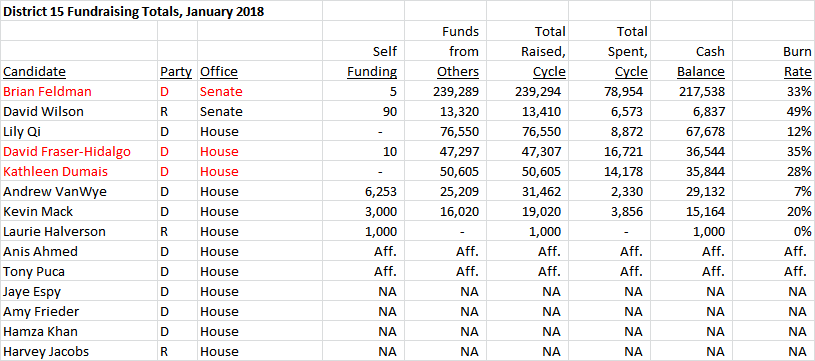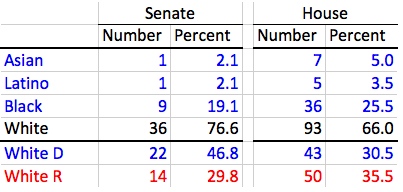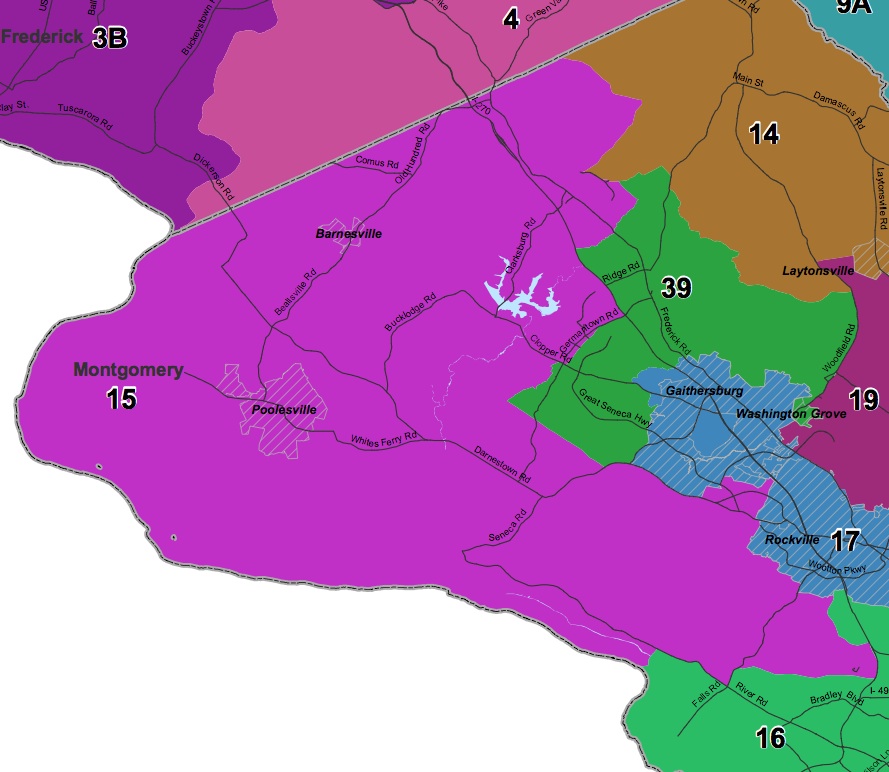Tag Archives: David Fraser-Hidalgo
Campaign Finance Reports: Districts 14 and 15, January 2018
By Adam Pagnucco.
Today kicks off a series of reports on fundraising in MoCo’s state legislative districts. Incumbents are marked in red.
District 14
This is by far the easiest MoCo state legislative race to figure out. All four incumbents – Senator Craig Zucker and Delegates Anne Kaiser, Eric Luedtke and Pam Queen – are going to be reelected. The end.
District 15
Senator Brian Feldman has achieved every politician’s dream: a complete deterrence of credible competition. Since he first won a House seat in 2002, he has never been at risk of losing an election. Meanwhile, four of his MoCo Senate colleagues (Cheryl Kagan, Rich Madaleno, Roger Manno and Nancy King) have endured tough races in recent years to gain or hold their seats. Will any serious candidate ever run against him? Of course, your author would be the first to sing Feldman’s praises as a public official and any challenger stupid enough to run would lose, but – dang it – Feldman is not doing his part to keep political bloggers busy!
Incumbent Delegates Kathleen Dumais and David Fraser-Hidalgo will be reelected despite their somewhat anemic fundraising. Of the candidates seeking to succeed Delegate Aruna Miller, who is running for Congress, Montgomery County Assistant Chief Administrative Officer Lily Qi looks like the strongest contender. Your author worked with Qi during his time in county government and found her to be smart, competent and forward-thinking. She was one of the uncommon people who could deal with the day-to-day tribulations of working for the county while also possessing the capacity to assume a perspective from 30,000 feet. Qi has done well at raising money, and with her standing in the local Chinese-American community, her admirers in the business community and the support of her boss, County Executive Ike Leggett, she has had a good start.
Kevin Mack, who is Congressman John Delaney’s constituent service lead, is well regarded by those who have interacted with him and is the principal alternative to Qi. But it’s not helpful that he trailed political consultant Andy VanWye in fundraising. Hamza Khan, who switched from the District 39 House race, has not yet filed his campaign finance report and is being fined by the Board of Elections. Republicans were once competitive in this district and held a Delegate seat here as recently as 2006, but they will not win any seats in the age of Trump.
The Big Question: will the incumbents slate with Qi as they slated with Miller, then a new candidate, in 2010? If they do, this race will probably be over.
General Assembly Racial Breakdowns
Elected to Maryland General Assembly in 2014
I’m in the middle of gathering data for a study on the election of African-American and Latino legislators, so I thought I’d share the data for the new Maryland General Assembly.
The Current State of Play
Minorities compose a greater share in the House than the Senate. While whites form three-quarters of all senators, they comprise two-thirds of all delegates. All minority groups are better represented in the House than the Senate.
Excepting the election of its only Asian member, Sen. Susan Lee (D-16), minority groups experienced more notable gains in the House, which saw its Latino and Asian membership more than double from 2010. New Asian delegates include Jay Jalisi (D-10), Clarence Lam (D-12), David Moon (D-20), and Mark Chang (D-32). David Fraser-Hidalgo (D-15), Maricé Morales (D-19), and Will Campos (D-47B) are incoming Latino delegates.
Partisan Gaps
Every single Asian, Latino, and Black member of the General Assembly is a Democrat. Whites remain split between the two caucuses. Interestingly, a majority of white delegates now sit as Republicans (50-43). Together, Asian, Latino, and Black delegates now form a majority of the Democratic House Caucus (47-43).
In the Senate, however, White Democrats form two-thirds of the Democratic Caucus and heavily outnumber White Republicans by 22 to 14. The greater preponderance of white Democrats stems partly from the greater success of Democrats in the Senate–all marginal seats are white majority districts.
The glaring gaps in the racial composition of the two parties reflects a national trend. African Americans have voted overwhelmingly Democratic since 1964. President Obama has increased the share of both Latinos and Asian Americans who vote Democratic. While his 43% of the white vote in 2008 exceeds that won by Clinton, Gore, or Kerry from 1992-2004, Obama won 39% of the white vote in 2012.
Racial gaps in voting are actually more muted in Maryland than many other places (i.e. more whites vote Democratic). In many southern states, blacks form a clear majority of a much smaller Democratic Caucus. Congress has no white members from a single state in the Deep South.
Assessing Racial Proportionality
American Community Survey Population Estimates
 The ratio of representation to population depends on how you measure both population and race. While districts are drawn based on total population, only adult citizens can vote. In addition to the total population, the above table shows the voting-age population (VAP) and citizen voting-age population (CVAP).
The ratio of representation to population depends on how you measure both population and race. While districts are drawn based on total population, only adult citizens can vote. In addition to the total population, the above table shows the voting-age population (VAP) and citizen voting-age population (CVAP).
On the Census form, people can now check multiple racial boxes (e.g. both White and Asian) and Latino is a separate category. The table includes only non-Latino Asians, Blacks and Whites who checked just one box in the appropriate category.
Minors comprise a higher share of the Black and Latino population than the Asian and White population, so the share of Blacks and Latinos among the VAP is lower than among the total population. Due to lower citizenship rates among Asians and Latinos, both groups comprise lower shares of CVAP than the VAP.
The net impact is that White Marylanders form 3.4% more of the CVAP than the total population. Latino Marylanders are 8.5% of the total population but just 5.7% of CVAP. Similarly, Asian Marylanders are a lower share of CVAP than the total population. The net effect for African-American Marylanders is almost a wash with a net gain of 0.6% in CVAP over the total population.
Changes Required for Racial Proportionality
No matter how you slice it, however, the share of Whites is higher than their share of the population in both the House and the Senate. African Americans, the largest minority group in the State, would need to add four senators and six delegates to their ranks to pull even with their share of Maryland’s CVAP.
However, Asians would need just one more senator to achieve CVAP parity in both houses. Latinos require one more senator and three additional delegates to draw even with Latino CVAP–a share still two-thirds of the Latino share of the total population.
Republican Ed Edmundson Not from Central Casting
 I don’t often meet Republican candidates here in Montgomery County, if only because they appear to be thin on the ground. So I was a little intrigued when I met up with Ed Edmundson, a candidate for the House of Delegates in District 15, at Starbucks.
I don’t often meet Republican candidates here in Montgomery County, if only because they appear to be thin on the ground. So I was a little intrigued when I met up with Ed Edmundson, a candidate for the House of Delegates in District 15, at Starbucks.
About Ed
Ed is a first time candidate reminiscent of past generations of Montgomery County Republicans, like Jean Roesser, Connie Morella, Betty Ann Krahnke and Howie Denis, who were liberal on social questions but more moderate or conservative on economic issues–long a winning formula in this area and indeed one that still works for several Democrats on the County Council.
Unusually for a Republican, he has been endorsed by NARAL, as have all three Democratic incumbents. It’s not often you hear a Republican talk about fair trade, ending “the school to prison pipeline,” and legalizing marijuana.
Ed gets more conservative on economic questions. He wants to cut the corporation income tax to make Maryland more competitive with Virginia. He also passionately believes that the regulatory structure created by the State and the County is too cumbersome and particularly a burden on small businesses.
On education, Ed proposes radical alterations to the teaching benefits structure by doubling teach salaries and eliminating pensions in favor of 401(k) plans. In my view, Ed is very fuzzy in terms of how to pay for large tax cuts and increased education spending. He wants the federal government to pay for increased education spending by cutting defense.
While decidedly out-of-the-box and even courageous for a Republican, it also requires decisions far outside the scope of the authority of the House of Delegates. State officials needs to pay for changes within the State’s own budget. The last four years have demonstrated that waiting on Congress is not a strategy. Despite this impracticality, Ed nonetheless brings a genuine passion regarding economic questions.
Specifically, he advocates for the positive, appealing part of the Republican message that government needs to work to encourage business and develop a more holistic strategy towards that end. And he expresses deep concern about those who view business with hostility rather than a crucial part of the solution.
In short, while his ideas haven’t gelled and the numbers don’t add up, the Republicans desperately need more people like him who don’t fear the future but who want to streamline government to promote prosperity and pay for needed government services. At least Ed shows some imagination, while Larry Hogan serves up the reheated sauce of “waste, fraud, and abuse” as “vision.”
Why Ed Won’t Win
Ed faces a lot of obstacles in his uphill bid for a delegate seat. First, District 15 has become much more solid Democratic turf since the Republicans last won seats in the area. Democratic partisans are now less willing to crossover and vote even for moderate or liberal Republicans–the undoing of Howie Denis on the County Council–because the national brand has become so tainted.
Second, District 15 has an extremely solid delegation with no weak links who could provide an opening. If Speaker Busch has good sense, he’ll find a way to appoint Kathleen Dumais as Judiciary Chair and sideline (Chair Emeritus?) past-his-sell-by date Joe Vallario. Aruna Miller has consistently struck most as smart, serious, and hard working. Recently appointed Del. David Fraser-Hidalgo has already made a positive impression. These are the sort of legislators we need to keep who make it difficult for opponents to make a good case to fire.
Third, there is always the Ficker problem. Running on a ticket with the ever-polarizing Robin Ficker, whose son is now running for delegate, seems an excellent way to assure that Democrats open to voting for some Republicans don’t give Ed a hearing.
Fourth, Ed is a complete newbie to campaigning. He plans to spend around $40,000, mostly his own money, and likely an insufficient amount for a serious delegate challenge in Montgomery County. Moreover, I don’t think he knows how to spend the money wisely as he is buying newspaper advertisements and sending no direct mail.
Still, it’s always up to the voters.
Fraser-Hidalgo Looking Good in D15
The Central Committee appointed then Del. Brian Feldman to the Senate when Sen. Rob Garagiola resigned the seat. There was some controversy over the appointment but it seemed inevitable to many as Brian is a well-regarded legislator who had the strong backing of his colleagues in the district.
Sen. Feldman is unopposed in the Democratic primary but faces perennial candidate Robin Ficker in the general. While he won one term as a delegate in 1978, he is better known for his antics at Bullets games back in the 1990s. Ficker will provide lots of fun spectacle but Feldman is a lock.
In the delegate races, Dels. Kathleen Dumais and Aruna Miller should also be sure shots for reelection. Both are perceived as serious legislators. Del. Dumais is currently Vice Chair of Judiciary and would be a logical choice to replace current Chairman Joe Vallario when he goes or gets pushed out.
In the meantime, she faces the unenviable job of navigating the tricky waters between her conservative chair and more liberal caucus. If she gets too close to Vallario, she risks demands that a stronger progressive will get the appointment. However, I’d be surprised if that happens because Dumais is respected, smart, and deserves the position in the eyes of many.
David Fraser-Hidalgo won the delegate appointment to replace the vacancy caused by Brian Feldman’s move to the Senate. Labor was not thrilled with this selection, compounding their frustration with MCDCC over other issues.
Consequently, newly minted Del. Fraser-Hidalgo has faced a harder fight to consolidate his hold on the seat than many appointees. However, despite the brevity of his tenure, he has already started to impress as intelligent and earnest, particularly through his hard work on the legislation decriminalizing marijjuana.
And his hold on the seat is starting to look stronger. He has won the endorsements of NARAL Pro-Choice Maryland and CASA. Most crucially, he has earned the support of his colleagues, who are including him now on a slate of all of the incumbents.
The other remaining Democrat in the race is Bennett Rushkoff. MCEA decided belatedly to endorse him after they completed their other legislative endorsements. Some were surprised as Fraser-Hidalgo voted with MCEA during the session. Regardless, the apple is a great endorsement to receive and should energize Rushkoff’s campaign.
Both Fraser-Hidalgo and Rushkoff will run campaigns with sufficient funds. Rushkoff likely has the jump on Fraser-Hidalgo because the latter could not raise funds during the legislative session. Rushkoff also loaned his campaign $50K before the January filing.
Nonetheless, this is the unusual case in which I don’t think MCEA has placed a good bet. Even without their endorsement, Fraser-Hidalgo is building a good reputation and his linkage with the other three incumbents will make him difficult to beat. Other factors, such as the Post endorsement or Rushkoff’s greater access to funds, could alter the equation but Fraser-Hidalgo has shown a steady ability to move the line in his direction.
On the Republican side, Flynn Ficker is running for the House alongside his father, Robin. Indeed, they have a joint website, so I guess they have identical positions. Interestingly, they oppose construction at Ten Mile Creek, which flies in the face of their more general opposition to government regulation. Their more general platform appears to be the unhappy, classic Republican combination of don’t tax but spend.
The other Republican, Ed Edmundson will likely garner much less attention than the ever colorful Fickers. However, he is actually more politically interesting. Edmundson is the only Republican in the State to have received NARAL’s endorsement. In some ways, he seems like a Democratic stereotype. How many Republicans advertise their belief in the importance of fair trade and that they run HempSisters.com and EarthDivas.com?
Though undoubtedly more conservative than the Democrats, Edmundson appears to have a similar socially liberal, economically moderate profile to the sort of Republicans who used to regularly win elections in Montgomery County. Unfortunately for him, they just don’t anymore. Changing demographics and the toxicity of the national Republican brand render it hard for candidates like Edmundson.
Fortunately for District 15, Feldman, Dumais, Miller, and Fraser-Hidalgo compose a very strong delegation in Annapolis. No weak links in this team.
Senate Rating: Safe Feldman.
House Ratings: Safe Dumais, Safe Miller, Lean Fraser-Hidalgo in the primary. Safe Fraser-Hidalgo or Rushkoff in the general.
How Marijuana Decriminalization Passed the House
As the session drew to a close, the prospects for marijuana decriminalization looked grim despite its passage by an overwhelming majority in the Senate. Judiciary Committee Chairman Joe Vallario had once again put the kibosh on the bill.
At Vallario’s behest, the Committee amended the bill to replace it with one that would create a task force to study the issue. As we say in Montgomery County, paralysis by analysis. So how did a bill decriminalizing the possession of small amounts of marijuana end up passing the House on Saturday?
First, Vallario made a critical mistake by passing any bill out of Committee at all. Though probably necessary to mollify committee members, it also provided decriminalization supporters a key opportunity to amend the bill back to its original intent.
Various advocates, including Dan Furmansky who has been lobbying on this issue, began to press legislators to put up a fight on the floor. Del. Eric Luedtke agreed to sponsor an amendment to overturn the Committee’s decision and restore the original intent of the bill.
Luedtke was a good choice. Del. Heather Mizeur has been active on this issue but her name on the amendment would have immediately doomed it due to gubernatorial politics in this election year. Ditto for Del. Jolene Ivey. Their willingness to step back and allow others to take the lead aided the effort greatly.
Bill advocates quickly began talking with Del. Keiffer Mitchell and Del. Nat Oaks who reached out to the Black Caucus. As this was going on, time passed and decriminalization proponents made the call not to offer their amendment on second reading, as it would have received only a couple dozen votes and died.
Economic Matters Committee Chairman Dereck Davis gave the effort a major boost when he advocated fighting for decriminalization on the floor to the Black Caucus and made a statement to that end in the media. Support from a respected member of leadership helped propel the amendment forward.
Key legislative advocates, such as Dels. Luedtke, Oaks, Mizeur, Ivey, David Fraser-Hidalgo, and Alonzo Washington, organized a whip operation supported by various advocacy groups like the ACLU. Republican Del. Mike Smigiel agreed to work on libertarian members of his party.
By the time they had close to 40 supporters, Vallario dug in his heals and made clear that he expected members of his committee to stick with him. But the House leadership forced him to ask the House to special order the bill, which it did, so he could negotiate with decriminalization advocates.
Del. Kieffer Mitchell agreed to sponsor the amendment, which was another good move to move matters forward, as attaching this junior but prominent African-American legislator’s name helped to emphasize the racial disparities associated with current enforcement of criminal penalties for marijuana possession.
By the end of the day on Friday, it became clear that Speaker Busch had released senior leadership to vote how they wished (i.e. to vote against Vallario), as Dels. Maggie McIntosh, Sheila Hixson along with Dereck Davis expressed their support. Like Davis, McIntosh proved especially helpful in gaining new supporters. The whipping operation was also highly visible on the floor.
Some Judiciary Committee members, like Dels. Curt Anderson and Luiz Simmons, began to rebel against sticking with Vallario. However, he still had support from others, such as Vice Chair Kathleen Dumais who has genuine reservations and Del. Jeff Waldstreicher who did not want to harm his excellent relationship with his committee chairman.
In the midst of all this, Vallario finally sued for peace. Good timing, as amendment supporters had received 66 firm commitments of support and he was about to get rolled publicly. Vallario and Dumais met with Bobby Zirkin, the Senate sponsor who had also been very active, to draft a new amendment. Mitchell and Luedtke were brought in later that night to help organize the plan for the floor.
Judiciary met on Saturday morning to ax the task force plan and recommend favorably the original bill as modified in small ways. Mitchell withdrew his amendment and matters proceeded according to regular order. As the bill was now a committee bill, it became critical for it to pass for the House leadership, particularly after all the contretemps surrounding it. And it did.
A few quick thoughts on the outcome. First, it showed that junior backbench members both can and will exercise influence on critical issues when committee chairs flout the will of the bulk of the Democratic Caucus. This was already a moderate, compromise bill. Remember it accomplished mild decriminalization–not full-scale legalization. Vallario’s repeated noes were not acceptable.
Second, Speaker Michael Busch did not have Vallario’s back. The Judiciary Committee Chair has simply opposed his Caucus too often on priority issues. Leaders don’t last long in power if they don’t listen to their members–something Speaker Busch and Senate President Miller understand far better than many realize.
MCEA Endorsements
The influential Montgomery County Educational Association has issued new endorsements for state legislative elections. So far, these choices are very conservative bets. They have endorsed all but one incumbent running for reelection.
In District 16, Susan Lee is also a lock for the Senate. All of the endorsed non-incumbent delegates are seen as having good chances, though the races in District 16 and 20 are the most up for grabs with other candidates having strong shots.
The only outstanding endorsement is in District 15 where recently appointed incumbent David Fraser-Hidalgo has not been endorsed. Rumor has it that they had planned to endorse challenger Bennett Rushkoff but that he did not receive the required super majority. We’ll see if MCEA picks Fraser-Hidalgo, Rushkoff, or no one.
Here is the current list with non-incumbents in boldface:
District 14
Senate: Karen Montgomery
Delegate: Anne Kaiser, Eric Luedtke and Craig Zucker
District 15
Senate: Brian Feldman
Delegate: Kathleen Dumais and Aruna Miller (one still pending)
District 16
Senate: Susan Lee
Delegate: Bill Frick, Ariana Kelly and Hrant Jamgochian
District 17
Senate: No Endorsement
Delegate: Kumar Barve, Jim Gilchrist and Andrew Platt
District 18
Senate: Rich Madaleno
Delegate: Al Carr, Ana Sol Gutiérrez and Jeff Waldstricher
District 19
Senate: Roger Manno
Delegate: Bonnie Cullison and Ben Kramer (no third endorsement)
District 20
Senate: Jamie Raskin
Delegate: Sheila Hixson, David Moon and Will Smith
District 39
Senate: Nancy King
Delegate: Charles Barkley, Kirill Reznick and Shane Robinson






